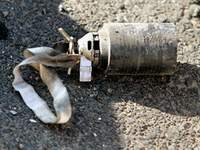Norway conference bans cluster bombs
A draft declaration under consideration at a 48-nation conference on cluster bombs calls for an international treaty banning the weapons by 2008, according to a copy of the document obtained Thursday by The Associated Press.

The one-page declaration said the treaty should "prohibit the use, production, transfer and stockpiling of those cluster munitions that cause unacceptable harm to civilians."
Norway hopes the two-day conference in Oslo will mark the start of a push to outlaw the weapons, despite opposition to the idea by several of the world's major military powers. The United States, China, Russia, Australia, Israel, India and Pakistan were not attending the meeting.
Thursday's draft declaration, obtained at the start of the conference, said countries should "conclude by 2008 a legally binding international instrument" to ban cluster bombs. Before the meeting there were concerns that some countries would not agree to that timeframe.
The treaty should also establish a framework for helping victims of cluster bombs, clearing the munitions and the "destruction of stockpiles of prohibited cluster munitions," the document said.
It also urged countries to consider banning such weapons before any treaty would take effect. Norway has already done so, while Austria announced a moratorium on cluster bombs at the start of the conference.
Cluster bomblets are packed into artillery shells, bombs or missiles, which scatter hundreds of the mini-explosives over vast areas, with some failing to explode and endangering civilians, often children, years after conflicts end.
Norway wants to initiate a worldwide drive against cluster bombs similar to the one banning anti-personnel mines, negotiated in Oslo in 1997. However, key countries that did not sign that treaty, including the United States, Russia and China, are also opposing a separate charter on cluster munitions.
Norwegian Foreign Minister Jonas Gahr Stoere said he believed the process could move forward regardless.
"I think we learned from the experience from the anti-personnel mine campaign in the '90s that if we were to wait for those countries to take the lead it will be a long wait," he said at a news conference.
"What we do here hopefully will engage those countries and that they will see merit to create rules and regulations to handle this issue. I'm not pessimistic in that regard."
He said countries should stick to the 2008 target because "any other target will be a wrong signal. We have to do what we can to reach that goal."
Steve Goose of Human Rights Watch called the Oslo conference a "critical juncture."
"Let us hope this meeting will be remembered as the meeting where a large number of countries decided that cluster munitions are not just another weapon," he told delegates.
The Cluster Munition Coalition, a campaign group co-hosting Wednesday's civilian forum, said as many as 60 percent of the victims in Southeast Asia are children. It said the weapons have recently been used Iraq, Kosovo, Afghanistan and Lebanon.
The U.N. has estimated that Israel dropped as many as 4 million of the bomblets in southern Lebanon during last year's war with Hezbollah, with as many 40 percent failing to explode on impact, the AP reports.
Activists say children can be attracted to the unexploded weapons by their small size, shape and bright colors.
The U.S., Russia, China, India, Pakistan and Japan say the weapons can be dealt with under the 1980 U.N. Convention on Conventional Weapons, known as CCW.
However, activist groups, and the Norwegian government, say those talks are stalled and a new avenue is needed.
Subscribe to Pravda.Ru Telegram channel, Facebook, RSS!




